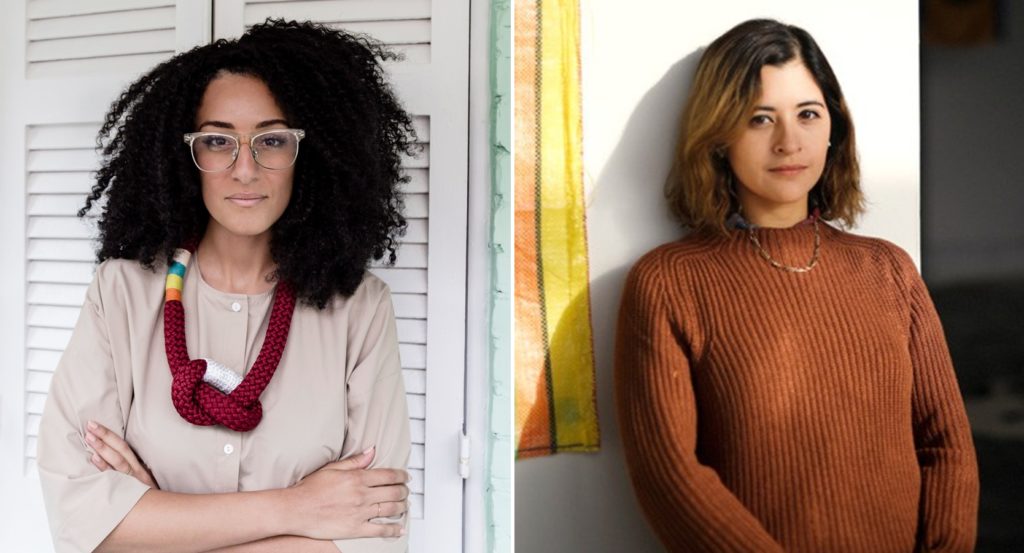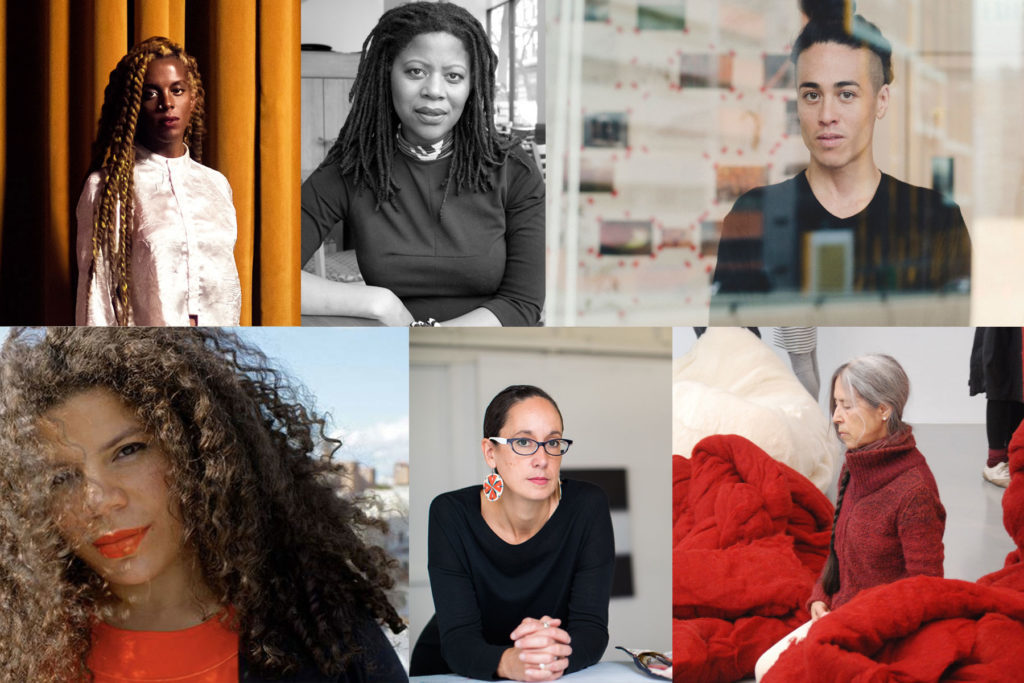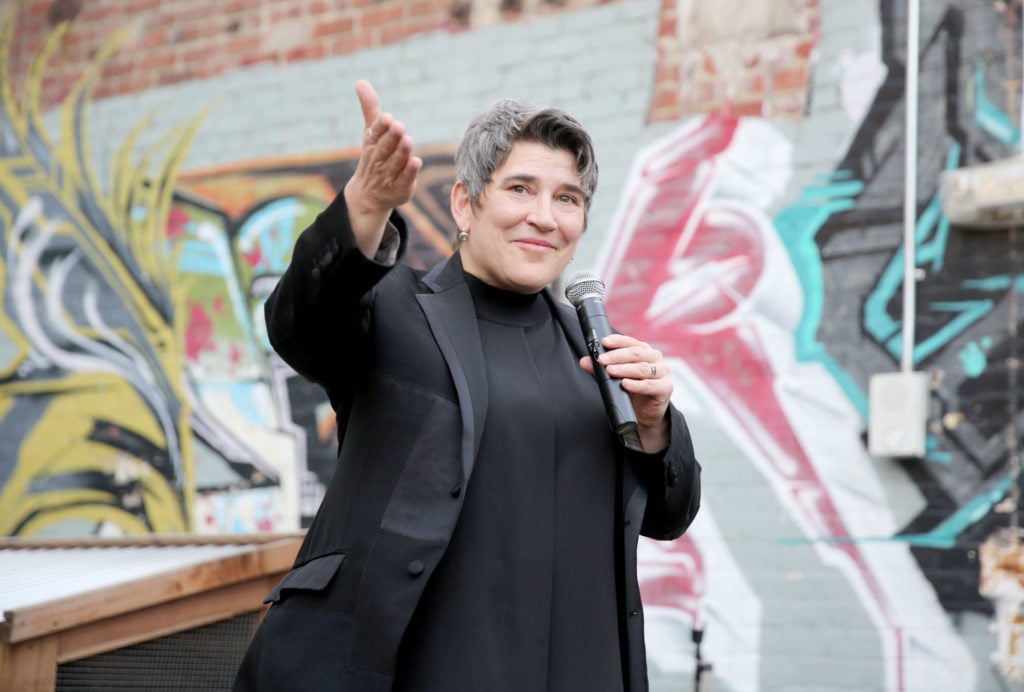Opinion
It Takes Many Non-Artists to Make Great Art Possible. That’s Why Our Organization Is Launching a New Award for Administrators
The thinking behind United States Artists’ new Berresford Prize.

The thinking behind United States Artists’ new Berresford Prize.

Deana Haggag &
Lynnette Miranda

Art isn’t made in a vacuum. It takes a village for art to impact culture and enter our public consciousness. Across the country, there are people working with artists to manifest the exhibitions we visit, albums we hear, and books we read. From producing a site-specific installation to editing a manuscript, artists and administrators work together to reveal new insights about ourselves as well as our communities, cultures, and histories.
In our work at United States Artists (USA), we celebrate artists in every corner of the country. Each year, we award nearly 50 artists a $50,000 grant—unrestricted, with no strings attached—to support their lives and acknowledge their value to society.
To find them, we are in constant conversation with hundreds of nominators across the country who identify the most compelling artists in their communities. This process—which represents nearly every discipline and genre, breadth of practice, experience, and region—has profoundly deepened our own understanding of how distinct cultural fields operate and the deep bench of cultural practitioners who are working to bring art to the public.
Since joining USA, we’ve found one thing in common across every discipline: the well-being of artists is cultivated by countless individuals who have dedicated their lives to creating the conditions for artists to thrive. Yet, like artists, these cultural workers—curators, producers, editors, administrators, and so forth—do not work in solitude, nor are they singular sources of creative genius. Instead, they are like the warp of a weaving—an integral structure that holds the fabric together as it evolves into different forms through the contributions of artists.

USA fellow Mickalene Thomas, Marie: Femme noire nue couchee (2014). Courtesy of Mickalene Thomas, Galerie Nathalie Obadia, and Artists Rights Society (ARS). © Mickalene Thomas.
The core work of this organization, since its founding in 2016, has been supporting individual artists. To date, we have awarded over $25 million to more than 500 incredible artists across the country. From internationally recognized art stars like Mickalene Thomas and Martha Rosler to best-selling authors like Claudia Rankine and Tayari Jones to world-renowned musicians like Wayne Shorter and Bill Frisell, master craftspeople like basket weaver Jennifer Heller Zurick and ceramicist Patti Warashina, and blockbuster directors like Barry Jenkins and Julie Dash, to playwrights, hula masters, fashion designers, podcast producers, landscape architects, and just about everything in between, we’ve had the opportunity to work with an extraordinarily broad and rich spectrum of creative talents.
Past awardees repeatedly told us to consider a new award that honors those who help artists make their work possible. We heard it from painters who credited long-standing relationships with curators for pushing them through their toughest moments, filmmakers who were eternally grateful to the producers who got their work out in the world, and writers who felt deeply that their editors were more like spouses than their actual spouses! From coast to coast, we heard stories of artists who were profoundly affected by collaborations with administrators across the country.
So, this year, we founded the Berresford Prize to recognize the individuals whose visionary contributions to the field are making spaces and structures that work with and for artists. Named for our visionary co-founder Susan Berresford, whose vision and leadership has made our work possible, this award honors the cultural practitioners who have contributed significantly to the advancement, well-being, and care of artists in society.

Winners of the 2019 United States Artists fellowships in visual art. Clockwise from left: Juliana Huxtable, Simone Leigh, Wu Tsang, Cecilia Vicuña, Dyani White Hawk, and Firelei Baez. Courtesy of United States Artists.
To develop this $25,000 award, we looked to visionary leaders we have lost such as the inimitable Red Burns, who trained thousands of artistic innovators through New York University’s Interactive Telecommunications Program; Peggy Cooper Cafritz, who founded the Duke Ellington School of the Arts in Washington, DC; Harvey Lichtenstein, the long-serving president of the Brooklyn Academy of Music; and Sam Miller, the director of Jacob’s Pillow and a tireless advocate for dance.
We spent countless hours trying to define the term “cultural practitioner” and labored over who qualified in an ever-changing landscape. The arts are no exception to the shifting working conditions that are reshaping nearly every sector on the planet. And as such, we wanted to ensure that this prize would honor folks working independently and within institutions, across all disciplines and regions. The deeper we delved, the more challenging it became to neatly define who this award was meant for until we realized that it was not about what those people did but rather how they did it.
We spoke with artists and other cultural leaders across the country to locate our first recipient. Throughout this process, they described these practitioners as generous, nimble, and thoughtful listeners and collaborators. They spoke at length about administrators being at the intersection of where artists, audiences, and institutions meet, framing how the work is translated while caring for every individual involved. They were framed as shape-shifters who navigated institutional structures, fighting for artists to give them the freedom to take risks, experiment, and conceive of new possibilities. They were called an imperceptible force that advocates for and works in alliance with artists.
As individuals who have worked closely with artists at presenting organizations before joining USA, this sentiment felt true to our own experience and working ethos. For us, the labor of administration is a gesture of love—a relational medium through which we show care and respect for artists and audiences. As such, the Berresford Prize celebrates the covert labor of cultural workers who are not only condition makers, but inflection points in the field.

CAP UCLA Executive and Artistic Director Kristy Edmunds on March 12, 2017 in Los Angeles, California. (Photo by Rachel Murray/Getty Images for CAP UCLA)
It is in this spirit that we are humbled to offer this opportunity, and are even more thrilled to name Kristy Edmunds as our inaugural awardee. Echoing the dozens of artists who named her, Kristy is a force for good in the field, building institutions and seeding programs that open up physical and intellectual space for artists to innovate and take risks.
From founding the Portland Institute for Contemporary Art to now leading the Center for the Art of Performance at UCLA, she has embodied a critical, humble, and selfless approach across various contexts that has expanded the reach of artists and, in turn, pushed the field forward. Kristy’s practice represents everything we intended for this prize—to empower individuals that cultivate and advance the arts ecosystem.
As one part of this ecosystem, we look to the future with an openness and urgency to funding that goes beyond preconceived notions of who and what should be supported. At USA, we pride ourselves on awarding individuals without the requirement of a project proposal or final report, and, in this, we have the opportunity to reframe who is supported and why. The framework we are building at USA is intended to be responsive to the field, highlighting the practitioners that work relentlessly, whether visible or not, to impact our society writ large.
We believe in artists. We also believe in the entire community that it takes for artists to flourish and culture to exist.
Deana Haggag is president and CEO of United States Artists. Lynnette Miranda is the program manager at United States Artists.